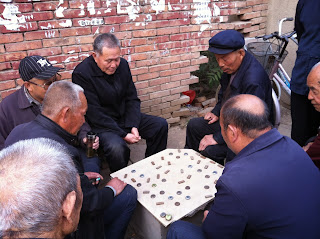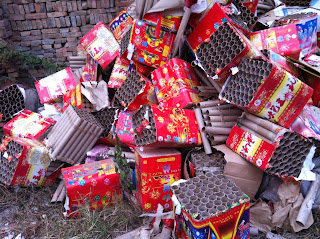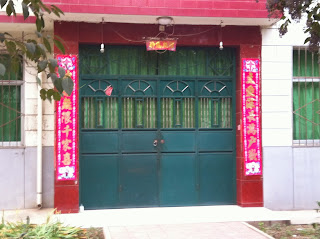Today
I heard a wonderful old story, called Butterfly Love. Long ago there
lived a rich man who, although he had five wives, had no children.
He desperately wanted a child and his sixth wife gave birth to a
girl, whom he doted upon. He gave her absolutely everything she
wanted. When she reached school age she wanted to go to school, but
school was only for boys and her father refused. She begged and
pleaded, and finally he compromised: she could go to school but only
if she dressed as a boy. She went to school for years as a boy and
fell in love with one of her classmates. The day of graduation she
told him she would meet him in the park the next day and give him a
surprise. When he arrived he saw her dressed as a girl and
understood she was his classmate, and he too fell in love with her.
The girl asked her father permission to marry the boy, but her father
refused: the boy came from a poor family and she could not do this.
He insisted she marry someone of his choosing, as has always been
done in China. She finally agreed to her filial duty, her father
chose a suitable husband for her, and she asked only that she be
allowed to say goodbye forever to the boy she loved. At his house
she learned he had died from lovesickness for her, and had been
buried. The next day was her wedding. On the way to her new
husband's house she passed by the boy's house and asked that the
sedan chair stop for a moment so she could pay her respects. She was
shown to the boy's tomb. As she stood there, the door to the tomb
opened, she stepped inside, and the door closed on her. Two
butterflies flew up, one to her father and one to the boy's parents,
and then the butterflies flew away together forever.
Although
I am not much of a shopper, I loved the lacquer store we went to
this morning. Such beautiful things! Such as this coffee table,
inlaid with mother-of-pearl and jade carvings:
Then
we went to an old Buddhist shrine where I learned about religion and
the Communist party in China. Confucianism is a philosophy, not a
religion. Most people were Buddhist. After the Communists came to
power in 1949 people were told they could choose between being a Party member and having a religion. Most people, even if they
weren't able to join the Party, a tightly controlled process, knew
which side of the bread the butter was on and skipped religion. Now
some people have gone back to Buddhism and some to the Christianity
the missionaries brought in the 1800s, but most have no formal
religion. However, there are a lot of holdovers: superstition,
ancestor worship, and belief in heaven, hell, and reincarnation.
Now, out of 1.35 billion people in China there are about 650 million
party members. In the generation that is now 40 or 50 years old it was
considered highly desirable to be a Party member: an apartment for
life, an easy job from which you could not be fired, and a reliable
and decent salary. Now people are much more interested in private
sector jobs even though they are less secure.
Honestly,
it is not possible to know by looking around that this is not a
completely capitalist society: it sure looks like it. Even the
apartment buildings are being built by private companies, not the
government any longer. But the government owns all the land,
cities and farmland, and leases it to people for free but only for a
term of seventy years. Farmers farm land that is assigned to them;
they do not own it. No one knows what will happen seventy years
after this policy began (whenever that was).
And
I learned why at least some sects of Buddhist monks are bald. Every
hair represents a worry, so they shave their heads. This is
completely anti-Confucian, which emphasized ancestor worship.
Because your entire body came from your ancestors, you'd as soon cut
off your hair as cut off your arm – all Chinese used to have long
hair and men wore theirs in ponytails and topknots.
Inside
a building at the shrine was a kang, about which I've read in books.
In the old houses in northern China, the way they stayed warm in the
winter was to build a fire in an adjoining stove (in the kitchen or
otherwise) and vent the hot air under the tiled platform which was
covered with a bamboo mat. They used a marble or wooden surface for
a pillow! At my feet just outside this picture was a small low table --
people slept on the kang and spent the day on it to keep warm in the
winter.
In
this room I learned that Mike is something of a calligrapher. He
wrote everyone's name on rice paper – which is actually paper made
out of bamboo. It is important to have just the right amount of
water in the ink: too much and it will spread through the paper, not
enough and it will not paint. Here is Mike writing my name. Jo
would be the family name, the character that sounds like “shan”
means colorful, and the character that sounds like “der” means
good person.
For
lunch we had mutton soup, something only found in Xi'an. You are
given a large bowl and you tear up something that looks like a thick
English muffin into tiny pieces and put them in the bowl. At your
place are two pieces of paper with the same number; you put one of
those on top of the bread pieces and give your bowl to the server.
Half a dozen appetizers are served while you wait for your soup,
which comes back to you according to your number – very sanitary.
It's lamb broth, very hot, with pieces of meat, scallions, seasoning,
and the little bread pieces now tasting like dumpling dough. I love
all the variety and the honored city-centric dishes.
Then
we went to a farmer's market, which was amazing. I saw totally
unfamiliar things – radishes almost as big as cabbages, gorgeous mushrooms, red carrots,
quail eggs, lotus root (which I can now recognize), and many other
things.
We passed the usual hundreds of tall apartment buildings under construction, just as I've seen everywhere. It's hard to believe there are enough people to fill them, but China is putting pressure on rural people to move to cities and is building enough housing for millions upon millions. Of course, one has to see them through the smog. China used to be 90 percent rural. It is now 70 percent rural and becoming more urbanized all the time, exactly the pattern of the United States in the 19th and 20th centuries.
We
went to Donghan Village about an hour out of Xi'an for dinner and to
spend the night. The village has been in this place for about 800
years. In the last fifteen or twenty years the government decided to help
people build new houses in the “new” village because the old one
was made of adobe and mud, needing to be repaired after every hard
rain. This house looks really bad but it has been abandoned for 15
years, and the adobe bricks the houses were made from are now
visible.
Here
are some men playing Go with stones and bottle caps for the two
sides.
There must have been a wedding here recently: here are the used fireworks containers.
The
houses in the new village across the main road are frankly spacious
and seem very prosperous to me. (Mike says this is a middle-class
farming village.) The government determined how much of a footprint
each house could have according to the number of people in the
family, and subsidized the building materials such that when the
houses were built they cost only $12,000; now they would cost much
more to build.
I
am staying in a house with three large bedrooms upstairs and a
bathroom; three other women, friends from Princeton who travel
together often, are in the other two bedrooms. Downstairs there is
a living room, a dining room, a kitchen, I don't know how many
bedrooms (parents, daughter age 15, mentally deficient son age about
18, mother-in-law), dining room and kitchen. It is considerably
larger than my house! Here is a picture of the woman of the house on
the right, her daughter in the middle, and her mother-in-law on the
left. After 2,000 years rural China is still rigorously patrilocal:
the bride moves to her husband's house and the groom brings his wife
home to live.
This
family essentially operates a bed-and-breakfast to augment their
farming income. Farms are an average of 2.5 acres per family allotted by size of
family and reallocated every four years to reflect changing family
size – reductions by deaths, daughters moving out, sons moving to
the city to work; additions by daughters-in-law and babies. City
people like to come to the “countryside” on the weekends either
for the day or to stay overnight, so they can taste fresh food –
although the food I have had in the cities certainly tastes fresh to
me – and so their children can see farm life, not many generations
removed for most city people.
Dinner
was much simpler than in the city, with fewer dishes. There was a
thin crèpe in which you put the scrambled egg, the bamboo shoots and the green
vegetable with a bit of meat. The dish in the front was some sort of
bread that tasted fried to me, and there was also soup. It was all
delicious.
After
dinner everyone went outside to the communal plaza for dancing to
music over a loudspeaker: Chinese music, the hokey-pokey, and the
macareña, I am not kidding.
The
toddlers had a great time running around.
It
was really cold out there, so I've come in to write. My bed has a
mattress warmer and a quilt; the temperature feels like 60 degrees at
most. I think I'll sleep in my clothes. Nonetheless, being here is
a huge privilege.





















No comments:
Post a Comment